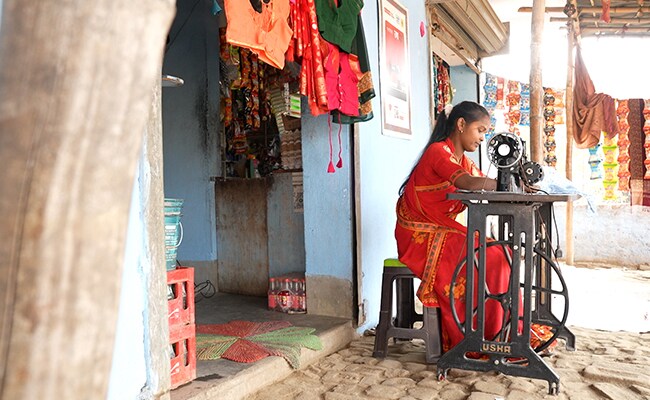- Home/
- The USHA Silai School Program: Turning Dreams Into Reality
The USHA Silai School Program: Turning Dreams Into Reality

The history of humanity has always been filled with narratives of remarkable women who have risen to every challenge. Jasinta Devi, a resident from a small village in Jharkhand, epitomizes this essence. Jasinta, much like her counterparts from around the world, dreamed of becoming financially independent and supporting her family through her work with sewing, stitching, and embroidery. The USHA Silai School has provided a platform for women to make their dreams into reality.
The USHA Silai School program, in collaboration with National Thermal Power Corporation (NTPC), is a testament to the power of skill-based training. Its goal is to empower women with practical skills that have a monetary value. This initiative empowers women to gain practical skills that are essential for employment.
Empowering Women In The Snow-Capped Mountains: USHA Silai School's Impact In Kargil
Jasinta Devi's story is one of transformation. She's now a teacher who supports herself and her children.
Jasinta said,
“Before I got married, I had limited knowledge about sewing and stitching. I didn't know how to cut and design clothes from scratch. But after taking the course, I learned how to work with the sewing machines and I am now teaching other women."
The success of the USHA Silai School program is not just about the skills it teaches but the profound impact it has on women's lives.
Sanjib Kumar Suar, Head of Project, NTPC North Karanpura, Jharkhand said,
"At NTPC, we are committed to the well-being of the communities surrounding our plants. Recognizing USHA's excellent work in skill development, we partnered with them to provide training programs aimed at empowering individuals in our local communities to achieve financial independence."
From Homes To Businesses: USHA Transforming Lives In Rural Odisha
Through the program, women acquire confidence, which they may use in their lives and in their families and communities. This newfound confidence can also lead to greater economic independence and empowerment.
Felix Tirkey, State Program Manager, USHA Silai School, Jharkhand said,
“We feel women are doing very well. In our early assessments, when we began, we saw they were earning nothing, it was zero earnings. But after opening the silai school, they have started earning around Rs 2,000 to 3,000 per month. This is a very big achievement.”
The stories of Jasinta and countless other women participating in the USHA Silai School program underscore the power of empowerment. Their success showcases the potential that resides within every woman, a potential that flourishes when provided with opportunities and support. These initiatives not only empower individuals but also contribute to a more prosperous and equitable society where women can thrive in all spheres of life.
Related Stories
More- Team NDTV | Monday February 16, 2026
Odisha's Suchismita Sahu, Rajasthan's Preeti Prajapat, Manipur's Akhirun—Usha Silai School's Kushalta Ke Kadam celebrates these awardees, from homemakers to master trainers earning accolades
- Team NDTV | Thursday February 12, 2026
From Ladakh peaks to Assam fringes, Usha Silai School trains tribal women in Turtuk, Kargil & Dakhinkuchi—crafting livelihoods with armed forces, NHPC & NGOs. Stitching national resilience
- Team NDTV | Thursday January 29, 2026
From West Bengal's transgender tailors to Telangana's tribal seamstresses and Meghalaya's embroidery revivalists, Usha Silai School's Kushalta Ke Kadam partners with NIRDPR and state governments
- Team NDTV | Tuesday February 03, 2026
In Odisha's mining heartlands, Mahanadi Coalfields Limited teams with Usha Silai School's Kushalta Ke Kadam and Gram Utthan, empowering tribal women turning them into entrepreneurs
Adopt a Silai School
About the Initiative

Kushalta Ke Kadam, an initiative by USHA Silai School and NDTV has entered its eighth season. The aim is to empower more women across rural India by teaching them sewing skills and helping them open new doors of opportunities for themselves. The initiative encourages rural women to become financially independent and entrepreneurs by taking up sewing and training others in their respective communities.
Since 2011, the USHA Silai School initiative has trained more than 12 lakh rural women through over 33,000 Silai schools, spanning over 20,751 villages across India.
The women earn Rs. 4,000 – 5,000 per month on an average, with the highest recorded monthly earning being Rs. 84,000 in a month. This earning works as a catalyst towards building their self-confidence, reducing gender inequities, and raising their stature within their families and in society at large.
In Pics

Rebari girls grow up learning traditional embroidery, which along with their new found sewing skills developed at Usha Silai Schools, is helping them earn a living.

Usha Silai School has empowered many rural women to support their family and send their children to school.

The Usha Silai School, established in a small nondescript village that goes by the name of Kottai, is helping empower people from varied communities.

The all-inclusive Usha Silai School Programme covers the entire nation from hamlets tucked between hills to villages cast by the sea.

Vegetables farmers from the Mizoram hills earn very little given the topography of the area. Usha Silai Schools have played an important part in this region by skilling women to financially contribute towards their households.

Usha Silai School learner Lucy has trained seven other women in her community, helping them to become financially independent.

Women like Kaviben from the nomadic Rebari community are finally laying down their roots as they begin to gain financial independence and thereby stability through Usha Silai School.

Usha Silai School, located in the Gujarat's Bhuj village, is enabling rural women to earn as much as Rs. 2,500-4,000 each month.

Usha Silai School, in association with a Gujarat based NGO called Kala Raksha, is trying to bring about a Silai revolution in Bhuj.

Besides training other women from their community, many Usha Silai School learners have become entrepreneurs in their own right.

With sewing becoming easily accessible and lucrative, the silai schools are also helping revive traditional motifs and designs.






